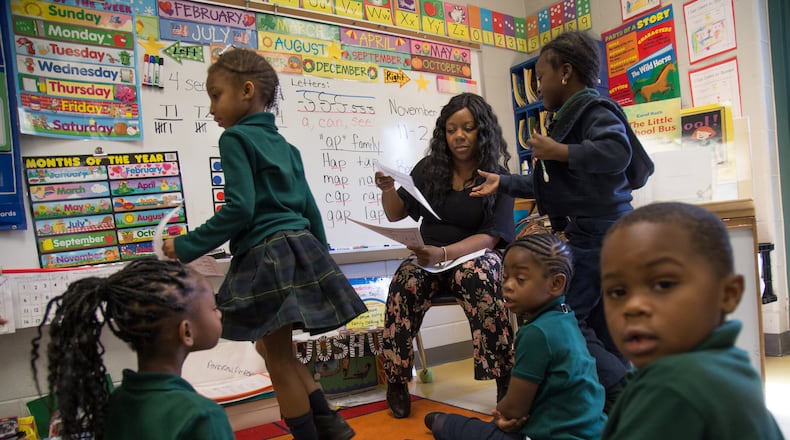Andrea Hicks' initial impressions of Narvie J. Harris Traditional Theme School were not good ones.
Hicks, who was 6 when she entered the school in 1999 as a first-grader, found the building’s gray walls depressing. In her previous schools, both public and private, students were greeted by colorful murals and student-produced drawings.
At Narvie Harris, students wore uniforms, walked the hallways in single-file lines and sported basic haircuts or styles. “Everyone looked almost exactly alike,” said Hicks, now 26 and a logistics account manager for a Fortune 500 company. “I didn’t know what the inside of a prison looked like as a first-grader, but I imagined Narvie as one.
“At the end of the day, I was shocked by the rules but I was okay with them because I was in the best public school in south DeKalb.”
The school, one of seven “Traditional Theme Schools” in the DeKalb County School District, began in 1996, offering some flexibility to the traditional curriculum and requirements in the hope of a better academic experience for students. The schools place higher academic expectations on students and restrict what they can wear and their hairstyles, while requiring volunteer hours from parents. They are for students in the school’s neighborhood.
Narvie Jordan Harris was the first black woman, and first living person, to have a school named after her in DeKalb County. Harris, who died in 2009, called herself the “first colored superintendent in the DeKalb County School System.”
Her namesake made news recently for hairstyle restrictions after a photo was shared more than 10,000 times on social media. It showed several pictures on a poster board of young black boys and girls with Mohawks, designs cut into their hair and braids with various colorful barrettes. All were deemed inappropriate at the school.
District officials declined to comment or allow access to school officials for this story. After the hair picture went viral, however, Regional Superintendent Sean Tartt, a former Narvie Harris principal, said this about the theme schools, through a district spokesperson:
“Theme schools throughout the district based on their community have different criteria, etiquette, ethnic diversity, tenants, and expectations for students. Parent councils, community groups and school leaders continually develop rules to maintain these expectations and ensure a healthy, positive and high-standard learning environment.”
Parents said the payoffs for adhering to the rules are what keep them salivating over the chance to get their children into the prestigious programs. The theme schools are among the district’s high performers on standardized tests, students often learn a second language, and many have gone on to Ivy League schools.
“Back then,” Hick said, “our parents had to take turns camping out in front of the school in order to get (us) registered.”
The theme schools, and other choice programs like it, have drawn criticism for pulling involved parents and star students from their regular neighborhood schools. On the 2019 Georgia Milestones End-Of-Grade tests, nearly two-thirds of Narvie Harris third-grade students scored proficient or better. At nearby Chapel Hill Elementary School, which is in the same student attendance zone as Narvie Harris, fewer than 15 percent of students were proficient or higher. District leaders over the years have pushed traditional schools to look at becoming theme schools, or to at least adopt some theme school practices. “The theme school model continues to reflect academic excellence, sculpts the total child, and leaves a positive impression,” Tartt said.
Unlike choice school counterparts — including magnet programs — the district's traditional theme schools cater largely to students of color. At Narvie Harris, 98 percent of the students are black. The schools' communities were involved in creating them, said Melvin Johnson, who recently retired from the DeKalb County Board of Education and worked in the district's administration when the theme schools were developed.
“It was a buy-in from everyone who attended that school,” he said. “When it was originated, the community decided what they wanted. It was a process.”
When the conversation erupted over the picture of the hairstyles, some parents from the school voiced their displeasure with the rules, saying they squelched student creativity. Johnson said attending a traditional theme school — and adhering to its rules — was a sacrifice students and parents were making to attend, signing contracts that obliged them to following those rules.
Hicks, who attended the school four years, agreed, adding the long-term benefits far outweighed her disappointment with basic wall colors.
“Looking back now, I noticed that my peers who came from the theme schools and private school have done well for themselves,” she said. “Some of my friends who attended the theme school have gone to Ivy League schools. Myself and others that attended private school and theme schools have gone on to become doctors, engineers, teachers, and other high-level jobs in the private sector.
“Parents who disagree with the rules are free to enroll their children at the neighborhood school.”
Traditional Theme School Guidelines
• Parents and students are expected to have an enrollment commitment for one year
• Once accepted, a student must be in attendance on the first day of school to maintain his/her placement
• Parents must complete parental involvement service hours for students enrolled at a theme school. If siblings are
enrolled at a theme elementary school and a theme middle school simultaneously, the parent must complete 50% of
the parental involvement service hours at each school to receive credit for parental involvement service hours
• Students must wear the designated uniform for the enrolled theme school
• Continued enrollment is contingent upon compliance with the theme school regulations and requirements that include
the completion of parent involvement service hours and student attendance
• Complete all school work assignments to the best of his/her ability
• Attend school regularly and arrive on time. Avoid excessive check-outs.
• Leave the campus promptly at the end of the school day or after participation in an authorized school activity.
• Conduct himself/herself in a manner appropriate for school
• Students currently enrolled and in good standing may continue participation in that Theme School Program
• When a theme school placement is declined or not filled by the assigned registration date, the student must reapply
for a theme school during the next open enrollment period
(Courtesy of the DeKalb County School District)
DeKalb’s Traditional Theme Schools
Edward L. Bouie Sr. Elementary School
Grades: Prekindergarten - 5
Narvie J. Harris Elementary School
Grades: Prekindergarten - 5
Marbut Elementary School
Grades: Prekindergarten – 5
Oakcliff Elementary School
Grades: Prekindergarten - 5
Robert Shaw Elementary School
Grades: Prekindergarten - 5
Wynbrooke Elementary School
Grades: Prekindergarten – 5
Champion Middle School
Grades: 6 – 8
About the Author
Keep Reading
The Latest
Featured



